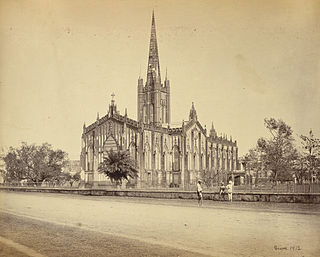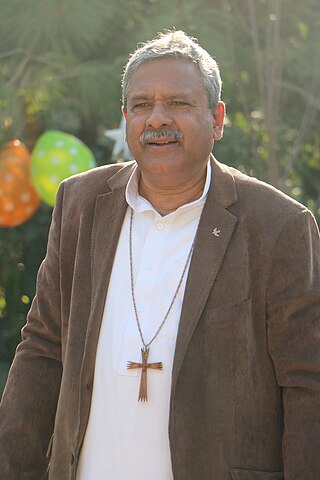
An episcopal polity is a hierarchical form of church governance in which the chief local authorities are called bishops. The word "bishop" here is derived via the British Latin and Vulgar Latin term *ebiscopus/*biscopus, from the Ancient Greek ἐπίσκοπος epískopos meaning "overseer". It is the structure used by many of the major Christian Churches and denominations, such as the Catholic, Eastern Orthodox, Oriental Orthodox, Church of the East, Anglican, Lutheran and Methodist churches or denominations, and other churches founded independently from these lineages.

In church governance, a diocese or bishopric is the ecclesiastical district under the jurisdiction of a bishop.
The Confessing Movement is a largely lay-led theologically conservative Christian movement that opposes the influence of theological liberalism and theological progressivism currently within several mainline Protestant denominations and seeks to return them to its view of orthodox doctrine, or form a new denomination and disfellowship (excommunicate) them if the situation becomes untenable. Those who eventually deem dealing with theological liberalism and theological progressivism within their churches and denominations as not being tenable anymore would later join or start Confessional Churches and/or Evangelical Churches that continue with the traditions of their respective denominations and maintaining orthodox doctrine while being ecclesiastically separate from the Mainline Protestant denominations.
In Anglican Christianity, low church refers to those who give little emphasis to ritual. The term is most often used in a liturgical sense, denoting a Protestant emphasis, whereas "high church" denotes an emphasis on ritual, often Anglo-Catholic.

The Church of South India (CSI) is a united Protestant Church in India. It is the result of union of a number of Protestant denominations in South India that occurred after the independence of India.

The Church of North India (CNI) is the dominant united Protestant church in northern India. It was established on 29 November 1970 by bringing together most of the Protestant churches working in northern India. It is a province of the worldwide Anglican Communion and a member of the World Methodist Council and the World Communion of Reformed Churches. The merger, which had been in discussions since 1929, came eventually between the Church of India, Pakistan, Burma and Ceylon (Anglican), the Methodist Church, Disciples of Christ, and some congregations from the United Church of Northern India.

The Church of Bangladesh is a united Protestant church formed by the union of various Protestant churches in Bangladesh, principally the Anglican and Presbyterian denominations. The Church of Bangladesh is full communion with the Anglican Communion. Also it's a member of World Communion of Reformed Churches.
The Right Reverend is an honorific style given to certain religious figures and members of a clergy.
Protestants in India are a minority and a sub-section of Christians in India and also to a certain extent the Christians in Pakistan before the Partition of India, that adhere to some or all of the doctrines of Protestantism. Protestants in India are a small minority in a predominantly Hindu majority country, but form majorities in the north-eastern states of Meghalaya, Mizoram and Nagaland and significant minorities in Konkan division, Bengal, Kerala and Tamil Nadu, with various communities in east coast and northern states. Protestants today trace their heritage back to the Protestant reformation of the 16th century. There are an estimated 20 million Protestants and 16 million Pentecostals in India.

Anglican interest in ecumenical dialogue can be traced back to the time of the Reformation and dialogues with both Orthodox and Lutheran churches in the sixteenth century. In the nineteenth century, with the rise of the Oxford Movement, there arose greater concern for reunion of the churches of "Catholic confession". This desire to work towards full communion with other denominations led to the development of the Chicago-Lambeth Quadrilateral, approved by the Third Lambeth Conference of 1888. The four points were stipulated as the basis for church unity, "a basis on which approach may be by God's blessing made towards Home Reunion":

The Anglican Church in North America (ACNA) is a Christian denomination in the Anglican tradition in the United States and Canada. It also includes ten congregations in Mexico, two mission churches in Guatemala, and a missionary diocese in Cuba. Headquartered in Ambridge, Pennsylvania, the church reported 977 congregations and 124,999 members in 2022. The first archbishop of the ACNA was Robert Duncan, who was succeeded by Foley Beach in 2014.

Christians have made many contributions in a broad and diverse range of fields, including the sciences, arts, politics, literatures, sports and business.

The Communion of Protestant Churches in Europe is a fellowship of over 100 Protestant churches which have signed the Leuenberg Agreement. Together they strive for realizing church communion, especially by cooperation in witness and service to the world. Prior to 2003 the CPCE was known as the "Leuenberg Church Fellowship".

In Christianity, the ordination of women has been taking place in an increasing number of Protestant and Old Catholic churches, starting in the 20th century. Since ancient times, certain churches of the Orthodox tradition, such as the Coptic Orthodox Church, have raised women to the office of deaconess. While ordination of women has been approved in many denominations, it is still a very controversial and divisive topic.

Foley Thomas Beach is an American bishop. He is the second primate and archbishop of the Anglican Church in North America, a church associated with the Anglican realignment movement. Foley was elected as the church's primate on June 21, 2014. His enthronement took place on October 9, 2014. He is married to Alison and they have two adult children.

Azad Marshall is a Pakistani bishop, currently serving, since May 2021, as the Moderator Bishop of the Church of Pakistan, a United Protestant denomination that is a member of the World Communion of Reformed Churches, the Anglican Communion, and the World Methodist Council. In the past, he was the sixth Bishop of the Anglican Church in the Islamic Republic of Iran, a diocese of the Episcopal Church in Jerusalem and the Middle East in the Anglican Communion, since 2007.

The Church of India, Burma and Ceylon (CIBC) was the autonomous ecclesiastical province of the Anglican Communion, associated with the Church of England, in British India.
Samuel Sammy Robert Azariah is a Protestant Pakistani bishop in the Church of Pakistan, a united Protestant denomination that holds membership in the Anglican Communion, World Methodist Council and World Communion of Reformed Churches. He is married to Khushnud and they have three daughters.

Humphrey Sarfaraz Peters is a Pakistani Protestant bishop. He has served as Bishop of the Diocese of Peshawar since 2011, and from 2017 to 2021, Moderator and Primate in the Church of Pakistan, a United Protestant Church that holds membership in the Anglican Communion, World Methodist Council and World Communion of Reformed Churches.















